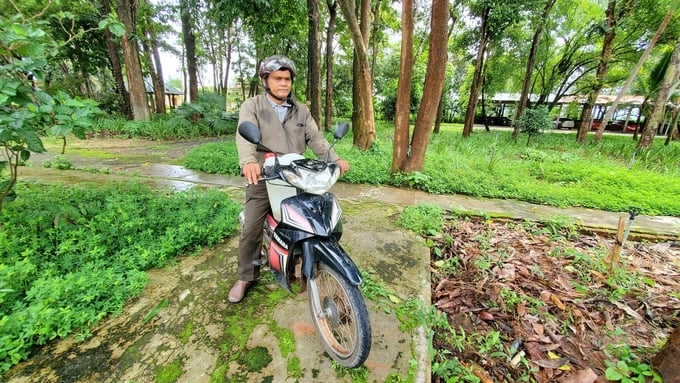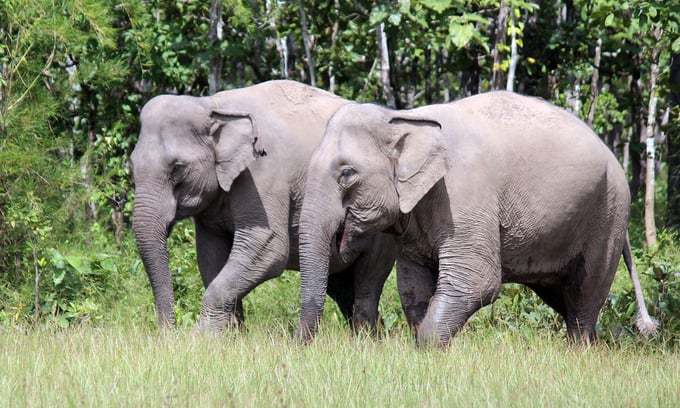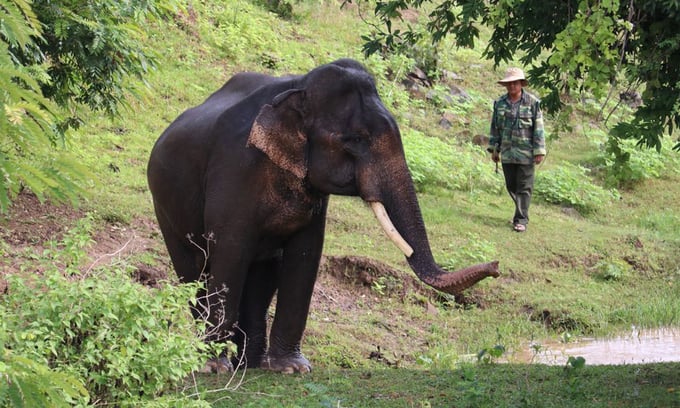May 20, 2025 | 22:38 GMT +7
May 20, 2025 | 22:38 GMT +7
Hotline: 0913.378.918
May 20, 2025 | 22:38 GMT +7
Hotline: 0913.378.918

Mr. Y Mat, previously the owner of elephant Y Khun, participated in the Tanh Linh elephant relocation campaign in 2001. He is now a ranger in Yok Don National Park. Photo: Bao Thang.
Elephant relocation is a complex issue. Eight years before the Tanh Linh forest elephant incident in 2001, there was a similar campaign to move elephants from Xuyen Moc, Ba Ria - Vung Tau to Yok Don, but it was unsuccessful. After moving to the new environment, all six elephants could not adapt and collapsed in the old forest.
Back to the story of Tanh Linh, the Government at the moment approved a budget of over 2 billion VND. International organizations also sponsored tens of thousands of USD to ensure the relocation of elephants. Each individual Tanh Linh elephant cost nearly 500 million VND, equivalent to more than ten gold trees at that time.
With the principle of capturing elephants alive to release them back into the wild, the campaign was meticulously prepared. Since Tanh Linh forest was craggy, domestic elements are the only means of accessing the wild elephant. Mr. Y Mat recalled that during a three-month training session, he had mastered the way to approach wild elephants and help mahouts control their legs. While humans were anesthetizing wild elephants, the domestic elephant helped help to move the wild ones.
It has been over 20 years, but the Deputy Director of Yok Don National Park, Huynh Nghia Hiệp (then the Deputy Head of the Forest Protection Department), still remembers it vividly. He says right before the campaign began in November 2001, the wild elephants in Tanh Linh suddenly went rough. Many measurements were applied after shooting anesthetic, such as tilting wild elephants to help them breathe or carefully calculating the shooting location to avoid elephants plunging into the cliff. Unfortunately, the first two wild elephants could not survive after anesthetizing.
The incident caused a stir in the public at the time. Mr. Y Mat himself, with many years of experience hunting wild elephants and directly training Y Khun, was interviewed by many central media. He affirmed: “Domestic elephants are strong enough to catch wild elephants.” According to the Ede man, two elephants participating in the campaign are enough to escort one wild elephant. This makes wild elephants less fearful and aggressive.
The faith of Y Mat and the determination of Nguyen Ba Thu, former Director of the Forest Protection Department at that time, were worthwhile. During the last week of November and the first week of December 2001, six wild elephants were captured and moved to Yok Don National Park safely. Among these is a leader elephant, known by experts as the “mango seed” because of its oversized footprint (42x53 cm).

Y Khun and Bun Kham, the domestic elephant duo who followed the Tanh Linh wild elephants relocation campaign in 2001, are now 60 years old. Photo: YD.
The campaign to relocate Tanh Linh wild elephants began on December 9th and ended on December 15th. The last individual, estimated to be the giant male elephant in the herd, retreated deep into Ong Mountain after the herd leader was captured. It hardly slept and wandered around day and night. Based on the stride left behind, experts believed this individual constantly escaped and had no fixed shelter.
Not only the elephants, the entire staff participating in the campaign and the staff of Yok Don National Park were always ready to prepare for the best conditions after moving from Tanh Linh. They were also sleepless for an entire month.
Mr. Nguyen Manh Hiep, son of Director Nguyen Ba Thu, said that his father stayed up many nights to gather elephants at Bau Chon (Binh Thuan), as well as decided to “capture elephants one by one” instead of capturing the entire herd at once.
According to Mr. Hiep, also an expert in conservation, Tanh Linh forest elephants are inherently aggressive. When being oppressed and locked up by humans, elephants react more strongly, roaring all night, wreaking havoc, and endangering people. Some longtime Yok Don National Park officials add that two domestic elephants guarded almost 24 hours a day in Tanh Linh elephant camp. Many nights they had to wag their trunks, stomp their feet, roar load to protect the rangers from the angry wild elephants.
Unlike Tanh Linh, a land of rubber and crops, Yok Don is reserved for the growth of wild plants. The herd of six elephants, including 4 mature individuals and 2 baby elephants, rushed immediately to the forest as soon as they arrived in Yok Don.
In the beginning, all six elephants refused to join the Yok Don elephant herds and instead caused chaos. Many times they crossed the territory and broke into residential areas in Dak Win, Ea Po, Nam Dong communes of Cu Jut district, Dak Lak province. They also destroyed crops, bewildering local farmers.
To solve this situation, Yok Don National Park proposed MARD to implement the project “Monitoring the living habits of wild elephants transferred from Binh Thuan to Yok Don.” The project aims to tame the wild Tanh Linh elephants. Through technologies, the rangers confirmed that four mature elephants were slowly adapting to the new environment. Interestingly, two male elephants showed attachment to Yok Don female elephants, which used to be domestic elephants.
However, the two baby elephants had a hard time integrating into the environment. They were to little (about 3-5 years old) when being released into the forest, so they could not live by themselves. Moreover, they were used to eating corn and cassava when in Tanh Linh, so they often wandered and got lost in residential areas.
Then Director of Forestry Department Tran Quang Bao was Head of the Nature Conservation Department then. He informs that MARD approved Yok Don National Park of taming two baby elephants. The task was reassigned to U Mat, who had been familiar with both elephants since the siege in Tanh Linh. Mr. Y Siem was also responsible for taming the elephants.
According to the tradition of elephant taming, garden officials named the two baby elephants Thong Ngan (meaning “golden coin”) and Thong Kham (“silver coin”). It took a long time for the mahouts to get along with the baby elephants. Mr. Y Mặt recalls: “They are like kids. If I take care of them, they will adore me. If I know how to teach them, they will obediently listen to me.”

A thief once tried to cut off elephant Thong Ngan's tusks. Over the years, the right tusks have grown almost as long as the left. Photo: YD.
In addition to taming the two wild elephants, the mahouts also let them explore the dipterocarp forest whenever they guide tours. The two Tanh Linh elephants often play together and test each other’s strength with their trunks. They also like to greet each other with fun pokes or nudges. Later, due to an incident of the mahout, Thong Kham was reassigned to the Elephant Conservation Center. Only Thong Ngan continued to participate in the friendly elephant tour model.
As a young and active elephant, Thong Ngan is not good at expressing to people. Initially, it helped transport tents, food and drinks for long camping trips. Later, like many other elephants in Buon Don, Thong Ngan participated in tourism activities. It is quite greedy: whenever it has to share sugarcane with other elephants, it tries to squeeze as much food as possible between its tusks and trunk.
In 2015, a group of people tried to steal Thong Ngan’s tusks. Before experts noticed it, they had cut two-thirds of its tusk, forcing experts to immediately take action. It took over six years for Thong Ngan’s tusk to recover. During our visit, we can hardly notice if any incident happened, which is fortunate.
Thong Ngan has gradually adapted to the new life, but conservationists of Yok Don National Park never ceased to give it the most attention.
Translated by Quynh Chi

(VAN) Dong Thap farmers attained an average profit margin of 64% during the summer-autumn 2024 crop (first season), while An Giang and Kien Giang farmers followed with 56% and 54%, respectively.

(VAN) As a doctoral student doing research on renewable energy and electrification at Harvard University, the author shares his musings on electricity, nature, and countryside memories.

(VAN) The decree on Extended Producer Responsibility (EPR) ensures transparent management and disbursement of support funds, avoiding the creation of a “give-and-take” mechanism.

(VAN) Hue City rigorously enforces regulations regarding marine fishing and resource exploitation, with a particular emphasis on the monitoring of fishing vessels to prevent illegal, unreported, and unregulated (IUU) fishing.

(VAN) Hanoi People's Committee has issued a plan on reducing greenhouse gas emissions in the waste management sector with 2030 vision.

(VAN) Vietnam's draft amendment to Decree No. 156 proposes a mechanism for medicinal herb farming under forest canopies, linking economic development to population retention and the sustainable protection and development of forests.

(VAN) In reality, many craft village models combined with tourism in Son La have proven effective, bringing significant economic benefits to rural communities.